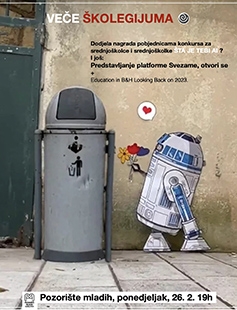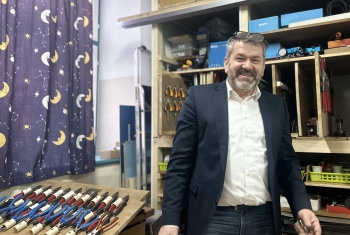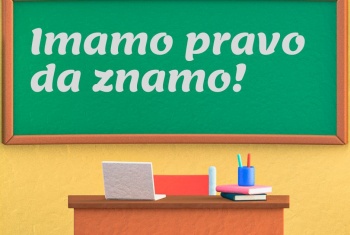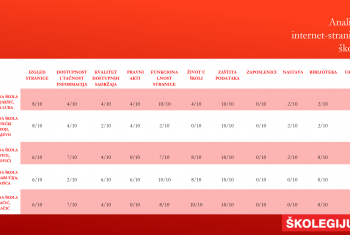The application of inclusion in education, due to constantly changing work instructions and the assignment of meaningless jobs to teachers, could turn into mobbing — as defined by the Handbook for the Human Rights Ombudsman of Bosnia and Herzegovina in cases of discrimination.
When inclusion entered schools in Sarajevo Canton in 2005, teachers knew almost nothing about Down's syndrome, autism spectrum disorders, dyslexia, dyscalculia, dysgraphia, hyperactive disorders, speech disorders and other types of developmental difficulties. At that time, schools did not have special education teachers, speech therapists, psychologists, or assistants — there was no rulebook on inclusive education, and teachers did not receive compensation for difficult working conditions.
The second phase of inclusion in shools began with the adoption of the Rulebook on Inclusive Education in 2019 — including the formation of mobile expert teams at the cantonal level and the hiring of assistants for students with developmental disabilities. Teachers then began to receive compensation for difficult working conditions, namely 1% of their hourly wage (up to a maximum of 10%). Those who taught 20 lessons would only be paid for ten of them. Because of this compensation, teachers are criticized for “unnecessarily” demanding that certain students work according to an individually adapted program (IAP, or in Bosnian: IPP). They are also criticized for requesting the creation of an IAP in order to gain the right to compensation for difficult working conditions, as well as for being “malicious” in cases when they realistically evaluate students and grade them negatively. Then they’re suspected of discriminating against students with difficulties. And with the Rulebook on Inclusive Education, work with children with disabilities should theoretically have been raised to a higher level. But the work has not, realistically, progressed — nor has it been made easier for teachers.
Assistants’ roles are unclear. The Rulebook on Inclusive Education stated that their role is to help the educator/teacher and professional associates in order to improve their work. The emphasis in the official description of their job is exclusively on helping students. Their exact tasks, however, remain unclear since the teacher creates the IAP, teaching materials, and is also obliged to communicate with the student during the lesson — ultimately, the teacher also does the checking and evaluation of students with developmental difficulties and writes reports on the evaluation of the IAP. At the same time, the Rulebook on Inclusive Education mentions the mobile expert team, the center's expert team, the institution's expert team and the Ministry's expert team, but it’s unclear whether the mobile expert team is also the Ministry's expert team. The institutions’ professional team is formed at the proposal of the school principal for the duration of two years. The team then undergoes training organized by the Ministry, from which it also receives accreditation. In the Basic Education Act of the Canton Sarajevo, which has greater legal force than the Rulebook, an expert team prepares the IAP at the suggestion of educators/teachers. In reality, the teacher proposes, creates, implements, evaluates and writes reports.
Even though teachers declared verbally at the beginning of this school year (2023/24) which students would work according to the Rulebook from 2019, the mobile expert team created a request form for the creation of an IAP. Have all mobile teams produced these forms, for all schools? Usually, each official form has its own primary school mark and number, and is also published in the Federation Official Paper (Službene novine), but this Rulebook does not have that. It seems that professional associates and principals can impose countless forms on teachers, as if we don’t already have enough administrative jobs...
The Rulebook says that the teacher or educator should send in a request for creating an IAP request to the school’s principal. Yet it doesn’t say that the request for the same student should be submitted every year. The Rulebook does not contain a special request form for the creation of an IAP, but only a form for the consent of parents/guardians to an IAP. This form contains the section “Explanation of the proposal,” and in cases when an educational institution (kindergartens, schools) submits the proposal, it must attach evidence of the measures taken to individualize the educational work. However, the mobile expert team has created its own request form for submitting a proposal for the creation of an IAP, with a space for an explanation, in which teachers should answer the following questions:
- what level of support does the student need to solve tasks and achieve goals?
- does the student attend supplementary classes in Your subject?
- in what way did You individualize the teaching content for the student?
- what are the minimum requirements from Your course that the student needs to pass, but has not passed?
- describe the ways in which You motivated the student for their participation and achievements in the educational process;
- did you adjust the teaching contents according to the abilities and possibilities of the students? If so, state the amount of material You adapted and in what way?
- did you adjust the teaching requirements according to the abilities and possibilities of the students?
- in addition to instruction at the group level, did You also give individual instruction to the student? Describe in what way;
- how do You test knowledge?
- did You give the student an oral examination/tests during the knowledge check?
- write down the strengths and interests of the students, as well as the need for support about previous educational achievements, learning styles, communication channels.
Since the mobile expert team requires that the teachers declare whether the student will work according to the IAP every year, the teachers for each student must sign the application and answer all these questions in September, even though assistants are only employed in August. What would the assistants and the mobile expert team do if the teachers don’t submit the IAP creation request? At the end of each school year, teachers write reports on the evaluation of the IAP and then, a month later in September, they are asked for an explanation again!
The evaluation is not clearly defined either. Here is an example: the teacher writes that the student couldn’t master the IAP1. The IAP2 simplifies the teaching content even more and the student receives the right to greater support from the professional team. The student cannot move to IAP2 without the consent of their parents, who usually don’t give consent because the child in this case is transferred to a center for children with difficulties, away from their regular school. Parents mostly try to avoid the transfer. I tried to realistically evaluate the students following the lessons, according to the IAP, but I was prevented. The mobile team verbally told us that the supervisors told them, also verbally, that a student with difficulties cannot get a grade lower than five [grade five is equivalent to an A grade]. After a while they said that students could actually still be graded lower…!? At the same time, we, teachers and educators, don’t know who these invisible supervisors are and whether they have ever even seen these students, unlike the teachers who work with students every day and have the most responsibility.
I recently had the opportunity to talk with an 8th grade student with a severe speech disorder combined with intellectual disabilities whose mother, to my great surprise, decided to enroll him in the center. Although he had the support of teachers and other students, he’s happy that he’ll no longer attend regular school, but rather will continue his education at the center. At the end of last year, unlike the teachers and assistants, the members of the mobile expert team argued that this student shouldn’t study according to the IAP.
Because of this and similar experiences, I think that there should be an external expert team that could decide which students will go to the centers and which will be educated according to an individually adapted program. It’s evident the members of the mobile expert team, assistants and educators/teachers can be subjective, and each of course for different reasons. Due to compensation rules for difficult working conditions, which since last year can be up to 300 BAM per month, teachers may attempt to have more students who study according to the IAP. But it should be taken into account that there is a difference between elementary and primary teaching. The teacher can receive maximum compensation even for working with only one student who studies according to the IAP, which is why it may happen that they do not request the creation of an IAP for all students who may need it. In this case, students with difficulties may end up entering the sixth grade without reading and writing skills, because of the lack of timely support
It seems like it’s in the interest of teaching assistants to have as many students with developmental difficulties as possible, but only until they get a contract signed for an indefinite period — then it’s in their interest that the student with difficulties does not have an IAP for all subjects.
It also seems like it’s in the interest of the members of the mobile professional team to have as many students with developmental disabilities as possible, but only until they get a contract signed for an indefinite period. Their interest is then to reduce the number of children who study according to the IAP, because they’ll have less work, but the same salary.
It’s the beginning of the school year. Like other teachers, I’m overwhelmed with the curricular reform and, as I read the new application form for creating an IAP, I experienced what psychologists call burnout. I created an IAP for students whom I believe should also attend classes according to the IAP. I wrote to the mobile professional team that, if they think that I haven’t submitted the relevant documentation, no student will study according to the IAP in the subjects I teach. Overnight I got a fever from the stress, the next day I was put on antibiotics and on sick leave. And what now?
A similar thing happened to me during online classes — every day I had three or four regular and up to seven IAPs for students with developmental disabilities. I had to create teaching materials for each program. Due to overload, I ended up on sick leave with carpal and cubital tunnel inflammation, which are conditions caused by tendon overload due to certain repetitive actions, such as typing on a keyboard. The last straw was the message from a mother of a student with developmental disabilities. She requested that I adapt my teaching material in a way it would fit a six-year-old! How does one adapt the textbook for the 7th grade so it fits a six-year-old? It’s a subject that students only start studying in the 6th grade, which means that, if it were possible to explain the content with the vocabulary of a six-year-old, all students would start studying that subject in the first grade. The same mother previously asked me to create teaching materials for her child that are totally outside the domain of my profession and are taught in a special program that I do not know nor own. She argued that she was in the right because I am paid to do that job. I wrote a request to the principal that the student I teach not attend classes according to the IAP and to waive my compensation for difficult working conditions (for one student at that time it was about 20 BAM in addition to my salary). The request was denied because the student must be in class and must have an assignment. In the end, I reported myself to the educational inspectorate, and their report confirmed that I had not done anything illegal. After all, I would never do something to the detriment of students, especially not students with difficulties. That year, I taught 16 classes with students with developmental disabilities, 13 IAPs each, and I was paid for only ten – determined by the collective agreement. My health problems continued; I was referred to the Center for Mental Health because I had psychological problems.
By themselves, students with difficulties are not a problem at all. It’s the senseless administrative requests, that can be seen as mobbing — and that lead to burnout and demotivation —that make teachers overwhelmed.
How long will it be like this?














